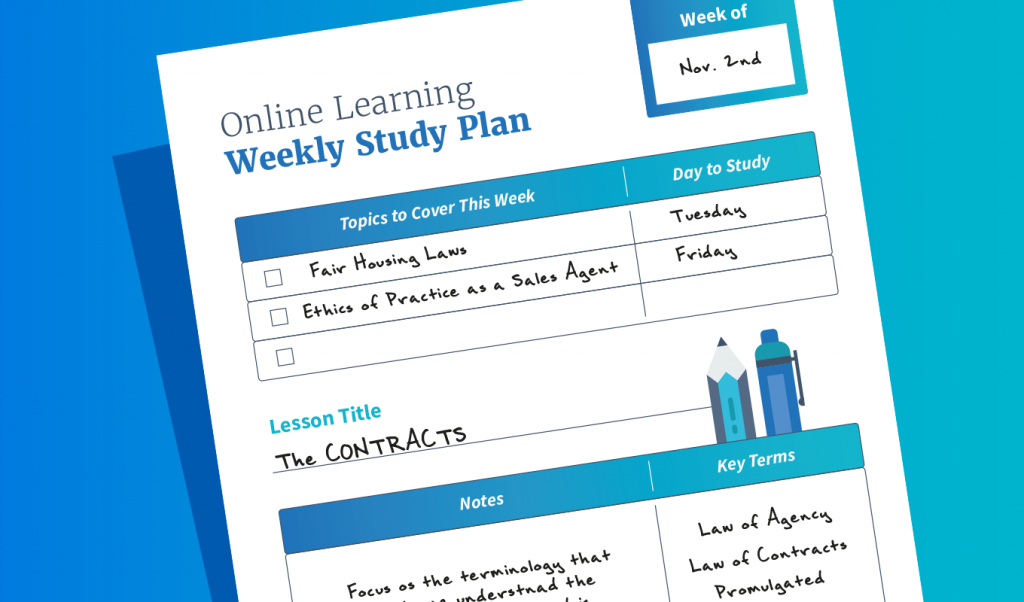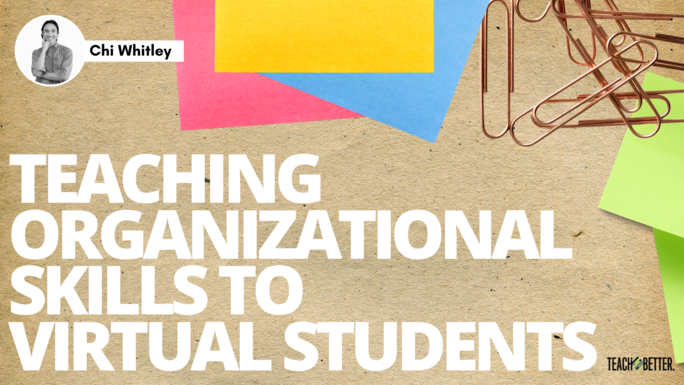TL;DR:
- For students, being able to organize one’s schedule and keeping track of assignments is a life skill.
- Being organized is a learned skill that takes some students more time to conquer than others.
- Students should feel accomplished after mastering organization skills, especially in virtual school.
- This post includes PDF copies of virtual organizers for students.
As a former educator, I can’t imagine the amount of organization needed to teach virtual school at any grade, but especially at the grade-school level. What’s even more difficult is teaching both in-person and virtual students simultaneously.
Setting the Example
As a teacher, personal and classroom organization is of the utmost importance. You want to set a good example for learners by being ultra-organized. Being organized will also demonstrate your ability to lead in the classroom and over the screen.
Furthermore, it feels terrible when you lose a student’s homework or graded assignment. I did it once myself and made sure to never do it again. There’s always a double standard for educators in the eyes of students. To students, teachers can’t preach what they themselves can’t do.
In virtual school, you are not the only one struggling to stay organized. Due to the repetitive nature of staring at a screen each day, many students are having an especially difficult time keeping track of their assignments and schedules. The guide below will help teach online students the importance of organization and how to stay on top of their studies each week. Older students will also learn to be proactive about their studies and will get in the habit of perceiving their schedules in months.
As society progresses, and more jobs rely on technology and using computers, students must be able to learn how to organize their lives in a digital world. - Chi Whitley Click To TweetBeing Organized is a Life Skill
You have most likely heard students say, “when will I use this [skill] in real life?” or some variation of the saying. Their question gets to the point of “how can I use this skill once I am an adult in the real world?” Well, like me, you might be at a loss for words or you’re seasoned enough to come up with a witty reply.
When you teach organizational skills, you can easily reply to students as they inquire, “how is this lesson useful for life?” Simply tell students that a disorganized life will cause them a lot of frustration and unnecessary stress. Being organized is an essential life skill that they will use daily, if not, hourly. Just remember that as you teach organizational skills, students will progress at different paces.
Students Will Progress in a Variety of Ways
As you know, nearly every student progresses at a different pace when it comes to learning material or a subject matter. Mastering organizational skills are no different. For some students, organization comes naturally. They enjoy an organized binder and schedule, while other students simply stuff all of their resources into their backpack and it never sees the light of day until the end of the grading period. To help students stay organized each week, have them use the printables below.
Teaching Organizational Skills: Using a Weekly Study Plan

Some students only track what assignments are due the next day or later in the week. However, as an educator, you want to be upfront with your students on what they can expect later in the week. For instance, if they have an upcoming quiz or test, they should know about it well in advance.
Especially for online students, they are in the same room staring at the same electronic device each day. Their eyes can easily glaze over as they lose focus. To help get students excited about organizing their weekly schedules, use this Weekly Study Plan. This Weekly Study Plan should be given at least three days in advance when preparing for an upcoming graded assignment that’s heavily weighted for the grading period.
At the end of each lesson leading up to the graded assignment, students can begin to review the material by filling out one of the three spaces for “topics to cover this week.” The “day to study” section can be completed the same day as part of their homework.
Each night, students should be jotting down notes and key terms to further cement the information covered that day. Most importantly, learners should write down questions for the instructor to help prepare for any review sessions before the quiz or exam.
Teaching Organizational Skills: Using a Monthly Study Tracker
![]()
The Monthly Study Tracker is best for students in middle and high school when they have month-long assignments, six-week calendars, and semester-long syllabi. In fact, the Monthly Study Tracker for online students can accompany the semester-long syllabus.
The Monthly Study Tracker can also assist virtual students in setting and accomplishing study goals. The study tracker can be time-based. For example, students can set a goal to study one subject for at least half an hour each night. Or, they can set the goal to study in half-hour intervals without glancing at a smartphone with ten-minute breaks in between. Another option is for virtual and in-person students to print the Monthly Study Tracker for each class.
[scroll down to keep reading]
Why Teaching Organizational Skills Now Matters
Teaching organizational skills to virtual students now will benefit them for the rest of their lives. As society progresses, and more jobs rely on technology and using computers, students must be able to learn how to organize their lives in a digital world. Even now, many professionals are still figuring out how to organize themselves as they work from home. It’s important to teach students today how to organize their online schedules and assignments so they are accustomed to doing so when taking college courses, online classes, and are working professionals.
About Chi Whitley
Chi is a former middle school teacher. He taught 7th-grade Writing at Memphis Rise Academy, a Building Excellent Schools (BES) charter school. Chi integrated his learning objectives with social, political, and environmental issues to create thoughtful and honest dialogues between students. He continues to teach and educate as a part-time lacrosse coach in Austin, TX.


